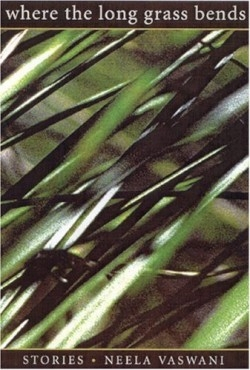Where the Long Grass Bends
This debut short story collection brings to life a sometimes fantastical group of characters whose experiences, countries, ethnicities, genders, and time frames widely range. From a Garwali-British orphan to a woman possessed by a spirit to a fashion-conscious schoolteacher to a half-Chinese man in need of a haircut to a Spanish survivor of war, these stories have one common thread—the state of being caught between two worlds, which isn’t always as unsettling as it sounds.
In “Five Objects in Queens,” a mixed-race family—the husband is Indian, the wife Irish—live their lives joyfully despite the wife’s recurring cancer. The two daughters remain close to their parents even after starting families of their own. The five sections of the story represent still-lifes-moments in time that stand out, even after their mother has succumbed.
“The Excrement Man,” which won the Italo Calvino Prize in 1999, is the surrealistic tale of Bundar, born with one blue eye, one brown eye, and a shock of white hair. Throughout his life he collects jars of his excretions, labeling them according to particular events. Despite his undying love for Mez, a childhood friend, he stops short of taking action with her. Neither gets what he or she wants, and they grow old, paralyzed by their dysfunction, Bundar collecting his jars, and Mez doling out advice to neighbors.
The author, who has published in Prairie Schooner and American Literary Review among others, is a PhD candidate at the University of Maryland. She also teaches writing at Spalding University.
In “Twang (Release),” Vaswani’s narrator confronts her willfulness with every step she takes. She grows up in a birch forest hunting game, using live foxes as pillows, and communicating with the trees. One day, like a fairytale heroine, she leaves the protection of all that she knows and ventures into the world, meeting a man who shows her, for the first time in her circumscribed life, the ocean. In the end, she returns to the forest that recognizes her, even though she loves the man. The willful heroine learns to let go.
Magic realism? Perhaps. Vaswani’s tales read a bit like Aimee Bender’s, bizarre yet grounded in this world. Even though the narrative voices in these stories are a little too similar—one story’s teller sounds much like another’s—the stories’ strength lies in the author’s gift for compelling, unusual yarns and excellent, zinging hooks. Here are a few opening sentences from the collection: “They used the backseat for misdemeanors.” “Ms. Durber will not buy sensible shoes.” “My name is Gussa, and last Thursday I came to live inside this woman.” Without a doubt, readers will see more of this writer’s gifted work in the near future.
Reviewed by
Olivia Boler
Disclosure: This article is not an endorsement, but a review. The publisher of this book provided free copies of the book to have their book reviewed by a professional reviewer. No fee was paid by the publisher for this review. Foreword Reviews only recommends books that we love. Foreword Magazine, Inc. is disclosing this in accordance with the Federal Trade Commission’s 16 CFR, Part 255.

